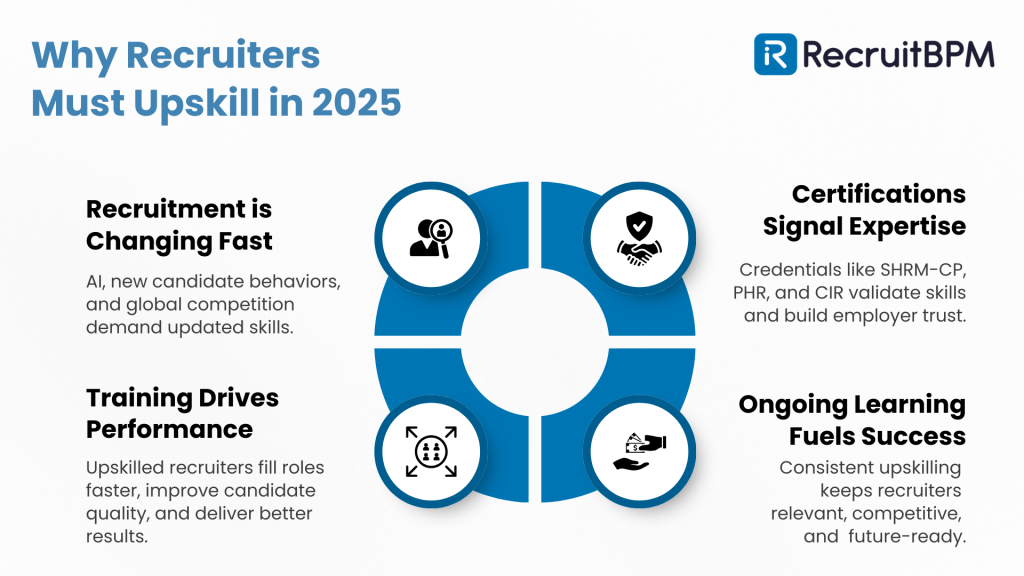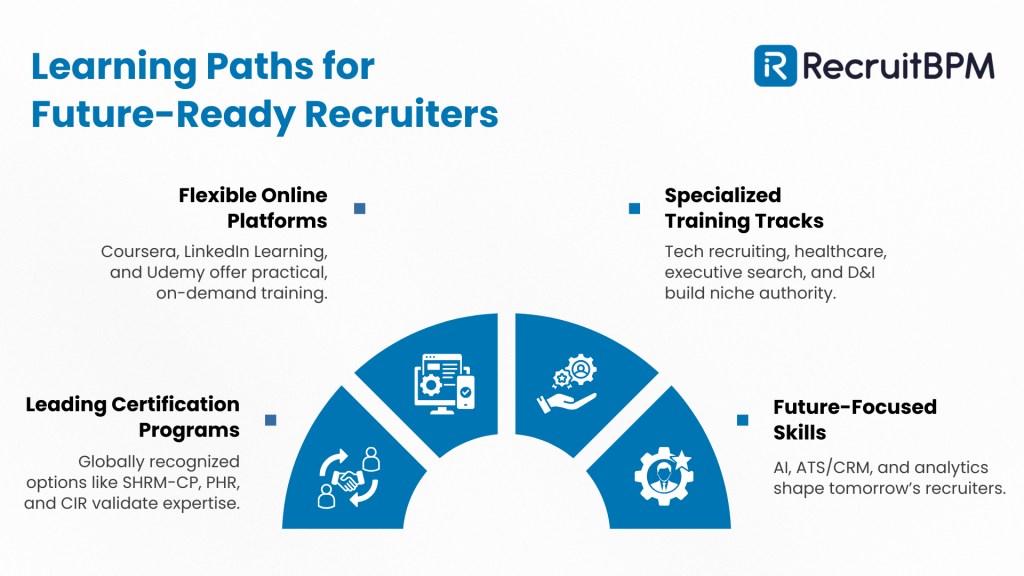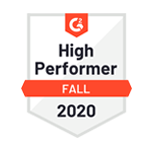The talent acquisition landscape has transformed dramatically. Today’s recruiters face AI-powered hiring tools, evolving candidate expectations, and unprecedented competition for top talent. Professional development isn’t just beneficial—it’s essential for staying relevant.
Over 78% of talent acquisition professionals report needing additional training to keep pace with industry changes. Whether you’re a seasoned recruiter or entering the field, the right courses can accelerate your career growth and improve your hiring outcomes.
This comprehensive guide explores the best recruitment courses available in 2025. You’ll discover certification programs, specialized training options, and practical skills that leading recruiters use to excel in their roles.
Why Professional Development Matters for Modern Recruiters?
The recruitment industry evolves faster than most sectors. New technologies emerge quarterly, candidate behaviors shift seasonally, and hiring strategies require constant refinement.
Professional development keeps you competitive. It enhances your sourcing abilities, improves candidate experience delivery, and increases your market value. Companies now prioritize recruiters with verified skills and current certifications.
Continuous learning also builds confidence. When you master new techniques, you approach challenging roles with greater expertise. Your clients notice this difference, leading to stronger partnerships and better placement rates.
The most successful recruiters invest 10-15 hours monthly in skill development. They view learning as revenue generation, not an expense.
Top-Rated Recruitment Certification Programs
Professional certifications validate your expertise and demonstrate commitment to excellence. Leading programs combine theoretical knowledge with practical applications.
SHRM Certified Professional (SHRM-CP)
The Society for Human Resource Management offers globally recognized credentials. Their certification covers recruitment strategy, talent acquisition, and workforce planning fundamentals.
SHRM-CP candidates study employment law, diversity hiring, and performance management. The program requires 180 contact hours or equivalent experience plus passing a comprehensive exam.
Cost ranges from $630-$830, depending on membership status. The certification maintains validity for three years with continuing education requirements.
Professional in Human Resources (PHR)
HR Certification Institute’s PHR focuses on tactical recruitment execution. This certification emphasizes practical skills over strategic planning.
PHR covers job analysis, sourcing techniques, interview processes, and selection methods. Candidates need one year of HR experience plus a bachelor’s degree or equivalent.
The computer-based exam costs $400 with $100 application fee. PHR holders report 18% higher salaries compared to non-certified peers.
Certified Internet Recruiter (CIR)
AIRS offers specialized training in digital sourcing and online recruitment strategies. CIR certification teaches advanced Boolean search, social media recruiting, and candidate engagement techniques.
The program includes hands-on practice with LinkedIn Recruiter, X-ray searches, and database mining. Participants learn to build talent pipelines and maintain candidate relationships.
Training spans three days with immediate certification upon completion. Investment varies by location and format, typically $1,500-$2,500.
Social Media Recruiting Certifications
Social platforms drive modern talent acquisition. Specialized certifications teach platform-specific strategies and engagement best practices.
Programs cover LinkedIn optimization, Facebook recruiting, Twitter sourcing, and Instagram talent branding. You’ll master content creation, community building, and conversion optimization.
Multiple providers offer these certifications, ranging from $300-$1,200. Choose programs with current platform knowledge and practical exercises.
Essential Skills Every Recruiter Should Master

Successful recruiters combine technical proficiency with interpersonal excellence. These core competencies separate top performers from average practitioners.
Boolean Search and Sourcing Techniques
Boolean logic unlocks hidden talent pools. Master operators like AND, OR, NOT, and parentheses to create precise search strings.
Advanced techniques include site-specific searches, file type filtering, and wildcard usage. Practice on Google, LinkedIn, and specialized databases until searches become intuitive.
Effective sourcing reduces time-to-fill by 40% and improves candidate quality significantly. Invest time mastering these foundational skills.
Candidate Assessment and Interviewing
Structured interviews predict job performance better than unstructured conversations. Learn behavioral questioning, competency evaluation, and bias mitigation techniques.
Develop scorecards for consistent candidate comparison. Practice active listening and note-taking to capture valuable insights during conversations.
Strong assessment skills improve hiring quality and reduce turnover rates. Clients value recruiters who consistently present qualified candidates.
Employer Branding and Marketing
Modern recruiting requires a marketing mindset. You’re selling opportunities, company culture, and career growth potential to passive candidates.
Study content creation, value proposition development, and candidate journey mapping. Learn to craft compelling job descriptions and engaging outreach messages.
Employer branding expertise differentiates you from competitors. Companies seek recruiters who enhance their talent attraction efforts.
Data Analytics and Recruitment Metrics
Data-driven recruiting improves outcomes and demonstrates value. Master key performance indicators like time-to-fill, cost-per-hire, and quality-of-hire measurements.
Learn to interpret trends, identify bottlenecks, and optimize processes based on analytics. Familiarize yourself with recruiting dashboards and reporting tools.
Analytics skills position you as a strategic partner rather than an order-taker. Hiring managers appreciate recruiters who speak their language.
Best Online Courses for Talent Acquisition Professionals
Online learning offers flexibility and comprehensive coverage. These platforms provide high-quality recruitment training with practical applications.
Coursera’s Recruitment Specialization Programs
The University of Minnesota offers a “Recruiting, Hiring, and Onboarding Employees” specialization. The program covers end-to-end talent acquisition processes.
Modules include workforce planning, sourcing strategies, selection methods, and new hire integration. Interactive assignments reinforce learning through real-world scenarios.
Specialization requires 3-4 months with 5-6 hours weekly commitment. Financial aid is available for qualified learners.
LinkedIn Learning’s Corporate Recruiter Path
LinkedIn’s platform provides insider knowledge of its recruiting tools. Courses cover LinkedIn Recruiter features, InMail optimization, and talent pipeline management.
Content includes sourcing best practices, candidate engagement strategies, and performance tracking methods. You’ll learn directly from LinkedIn’s talent acquisition team.
Subscription costs $29.99 monthly with unlimited course access. Many employers provide LinkedIn Learning benefits to staff.
Udemy’s Comprehensive Recruiting Courses
Udemy offers diverse recruiting courses from industry practitioners. Popular options include “Complete Recruiting Course” and “Tech Recruiting Fundamentals.”
Courses feature downloadable resources, practical exercises, and lifetime access. Instructors often provide real examples from their recruiting experience.
Individual courses range $15-$200, frequently discounted. Look for highly-rated instructors with recent industry experience.
Free vs. Paid Training Options
Free resources provide basic knowledge but lack depth and certification. Paid programs offer structured learning, expert instruction, and verifiable credentials.
Consider your career goals when choosing between options. Entry-level recruiters benefit from free introductory content. Experienced professionals should invest in paid certifications.
Balance cost with potential return on investment. Quality training pays for itself through improved performance and career advancement.
Specialized Training for Different Recruiting Niches
Niche recruiting requires specific knowledge and techniques. Specialized training helps you excel in particular industries or roles.
Technical Recruiting Fundamentals
Tech recruiting demands understanding of programming languages, development methodologies, and engineering culture. Learn to evaluate technical skills and cultural fit.
Programs cover software development lifecycle, coding interview techniques, and technology trend awareness. You’ll master technical terminology and assessment methods.
Technical recruiters earn premium compensation due to specialized expertise. Investment in tech training yields significant career returns.
Healthcare and Life Sciences Recruiting
Healthcare recruiting involves complex licensing requirements, regulatory compliance, and specialized certifications. Learn industry-specific terminology and qualification standards.
Training covers clinical roles, research positions, and administrative functions. You’ll understand credentialing processes and continuing education requirements.
Healthcare recruiting offers stability and growth potential. Aging populations drive consistent demand for qualified professionals.
Executive Search and Leadership Hiring
Executive search requires different skills than volume recruiting. Learn confidential search processes, C-level assessment techniques, and board presentation methods.
Programs emphasize relationship building, market mapping, and succession planning. You’ll master executive compensation negotiation and reference checking procedures.
Executive search generates higher fees and builds valuable networks. Consider this specialization for career advancement and income growth.
Diversity and Inclusion Recruiting
D&I recruiting addresses bias, expands sourcing channels, and creates inclusive experiences. Learn unconscious bias recognition, diverse talent identification, and inclusive interview practices.
Training covers legal compliance, cultural competency, and measurement strategies. You’ll develop skills to build diverse talent pipelines and inclusive hiring processes.
Companies prioritize D&I initiatives. Specialized knowledge positions you as a valuable partner in creating equitable workplaces.
AI and Technology Training for Future-Ready Recruiters

Artificial intelligence transforms recruiting workflows. Understanding AI tools and applications ensures future career relevance.
Generative AI for Recruitment Tasks
ChatGPT and similar tools streamline content creation, candidate screening, and communication tasks. Learn prompt engineering for job descriptions, interview questions, and outreach messages.
Practice using AI for resume parsing, candidate matching, and market research. Understand limitations and maintain human oversight for critical decisions.
AI adoption accelerates productivity and improves quality. Early adopters gain competitive advantages in efficiency and candidate experience.
ATS and CRM Optimization
Applicant tracking systems and candidate relationship management platforms require optimization for maximum effectiveness. Learn configuration, automation, and integration techniques.
Master workflow design, pipeline management, and reporting setup. Understand how to leverage system capabilities for improved efficiency.
System expertise makes you valuable to employers and clients. You become the person who maximizes technology investments.
Recruitment Analytics and Big Data
Big data reveals patterns invisible to human analysis. Learn to interpret large datasets, identify trends, and make data-driven decisions.
Study predictive analytics, machine learning applications, and statistical analysis methods. Understand how to translate data insights into actionable strategies.
Analytics skills position you for leadership roles. Data literacy becomes increasingly important as recruiting becomes more metrics-driven.
Social Media and Digital Sourcing Tools
Social platforms evolve continuously with new features and algorithms. Stay current with platform changes and emerging sourcing tools.
Learn automation tools, Chrome extensions, and specialized databases. Master integration between different platforms and systems.
Tool mastery increases your sourcing effectiveness and candidate reach. Technology proficiency differentiates you from competitors.

How to Choose the Right Course for Your Career Goals?
Selecting appropriate training requires honest self-assessment and clear goal definition. Consider these factors when evaluating options.
Assessing Your Current Skill Level
Identify knowledge gaps through skills inventories and performance reviews. Ask supervisors and colleagues for honest feedback about improvement areas.
Compare your abilities to job requirements for target roles. Focus training on areas that provide maximum career impact.
Accurate self-assessment prevents wasted time on unnecessary training. Target specific deficiencies for efficient skill development.
Budget and Time Considerations
Professional development requires investment of time and money. Calculate potential return on investment for different training options.
Consider employer reimbursement programs and tax deductions for education expenses. Many companies support employee development through tuition assistance.
Balance comprehensive programs with specific skill-building courses. Create multi-year development plans for systematic improvement.
Industry Recognition and Credibility
Choose programs from reputable organizations with industry recognition. Verify instructor credentials and program outcomes before enrolling.
Research employer preferences for specific certifications. Some companies prefer particular credentials for advancement opportunities.
Credible programs enhance your professional reputation and marketability. Investment in recognized training yields better career returns.
Practical Application Opportunities
Select courses offering hands-on practice and real-world applications. Theory without practice provides limited value in recruiting roles.
Look for programs including case studies, role-playing exercises, and project-based learning. Practice reinforces knowledge and builds confidence.
Practical training translates immediately to improved job performance. Applicable skills demonstrate value to employers and clients.
Maximizing Your Investment in Recruitment Education
Training investment requires a strategic approach for optimal returns. Follow these practices to maximize learning benefits.
Creating a Personal Development Plan
Develop structured learning plans with specific goals and timelines. Map training to career objectives and performance improvement areas.
Schedule regular learning sessions and track progress consistently. Treat professional development as an essential business activity, not an optional pursuit.
Written plans increase accountability and ensure consistent progress. Review and adjust plans quarterly based on results and changing needs.
Building a Professional Portfolio
Document your learning achievements through certificates, projects, and case studies. Create a portfolio showcasing skills and knowledge gained.
Include metrics demonstrating improved performance after training completion. Quantify results whenever possible to show concrete value.
Professional portfolios support promotion requests and job applications. They provide evidence of commitment to continuous improvement.
Networking and Community Engagement
Connect with fellow learners and industry professionals through training programs. Build relationships that support ongoing career development.
Join professional associations and online communities related to your training areas. Share knowledge and learn from experienced practitioners.
Strong networks provide job opportunities, referrals, and ongoing support. Invest time building meaningful professional relationships.
Measuring Learning Outcomes
Track performance improvements following training completion. Measure metrics like placement rates, time-to-fill, and candidate satisfaction scores.
Request feedback from clients and candidates about service improvements. Use data to demonstrate training value and identify additional development needs.
Measurable outcomes justify training investments and guide future learning decisions. Continuous measurement ensures optimal returns on education spending.
Ready to Transform Your Recruitment Career?
The best recruiters never stop learning. They continuously develop new skills, master emerging technologies, and adapt to industry changes.
Your investment in professional development pays dividends throughout your career. Enhanced skills lead to better placements, stronger client relationships, and increased earning potential.
Start with courses addressing your most critical skill gaps. Build momentum through early wins, then expand into specialized areas aligned with your career goals.
Discover how RecruitBPM’s AI-driven platform can amplify your newly acquired skills. Our integrated ATS and CRM system streamlines workflows, automates routine tasks, and provides analytics that support data-driven recruiting decisions.
Schedule a personalized demo to see how our technology complements your professional development investment and accelerates your recruiting success.

















